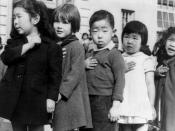JAPANESE LOYALTY AND THE INTERNMENT In the movie Gladiator, Maximus is a Roman general who is enslaved after leading his army through many battles. While he fights for his freedom as a Roman gladiator in the coliseum, his soldiers learn that he is still alive and are willing to go against the Roman Empire to help their general. These men were loyal to Maximus because he had shown that he was a fearless leader who cared more for those who served beneath him than for his own well being. He earned this loyalty by being willing to die for every man he went to war with. This type of loyalty is one of the strongest bonds that can be formed. It illustrates the type of devotion to a person or cause that cannot be broken. Loyalty is a strong virtue that is the basis for relationships between both people and causes.
Many Americans have this strong sense of loyalty in their country. While they may have various ethnic backgrounds they are united under one flag, or are they? During the Japanese Internment many loyal Americans were unjustly placed in camps and robbed of many the freedoms that America stands for.
Japanese Americans had a strong sense of pride in their heritage. They loved their homeland and brought many of their traditions with them when they came to America.
Many proudly displayed Japanese flags and kept the strong family structure that was a way of life in Japan. Does this make them any less of an American? All ethic groups bring something from there respective countries with them when they begin their new lives in America. The Japanese were no different. They had their own foods, clothing, and way of life. There is no question that they were a distinct group...


